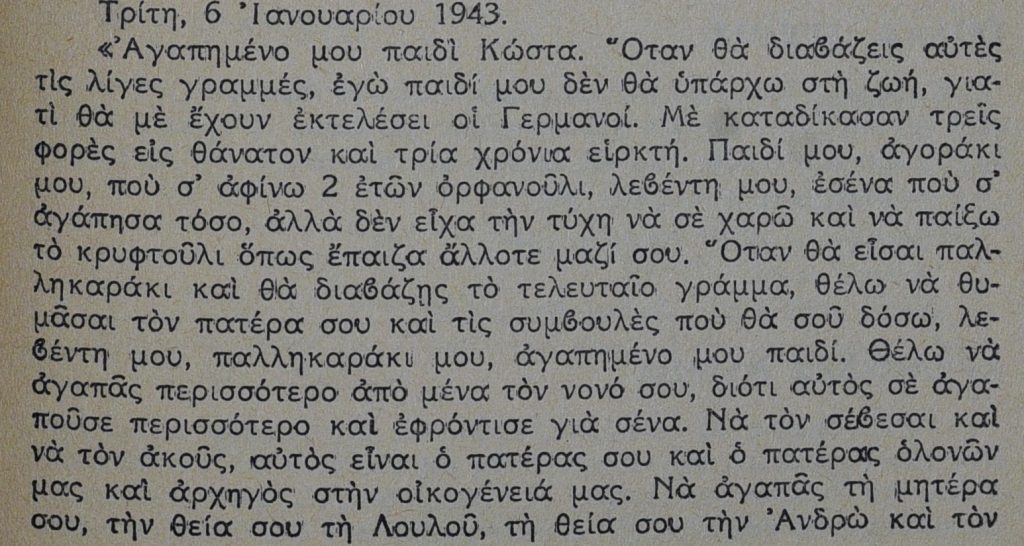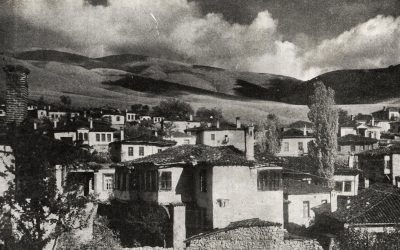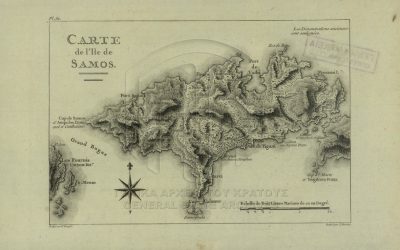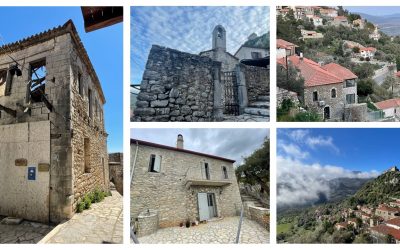In the realm of genealogy and historical research, there are few experiences more heartwarming and rewarding than when the past and present converge to illuminate the stories of our ancestors. In October 2022, we were fortunate enough to share an article that touched the hearts of many, shedding light on the last words of Greek warriors executed during WWII. Little did we know that this article would pave the way for someone’s reconnection with their own family history and heroic legacy and inspire a quest that would span across continents.
The “Second Office”
It is April 1943 and Nazi cruelty dominates Greece. The widespread and heartless executions of Greek prisoners, Resistance fighters, and patriotic individuals were a grim reality. Families of the prisoners faced an agonizing and uncertain wait, as the Nazis refrained from issuing any official announcements regarding the fate of their loved ones.
Amid this harrowing backdrop, Archbishop Damaskinos, the leader of the Church of Greece, took a compassionate and decisive step. He established a special office within the Archdiocese, known as the “Second Office.” Its formal title was the “Service for the Protection of Orphaned Families,” and its dual mission was clear: 1) to systematically gather information concerning those who had been executed and convey this crucial information to their families, and 2) to provide both financial and emotional support to the families, assisting them in meeting their essential needs during these trying times. Director of the “Second Office” was appointed Ioanna Tsatsou, sister of poet Georgios Seferis and wife of President Konstantinos Tsatsos.
Through the dedicated work of the Archdiocese, local churches, and Ioanna herself, a comprehensive effort was initiated to gather data on individuals who had been executed, along with details about their personal backgrounds, the circumstances leading to their arrest, imprisonment, and eventual execution. Simultaneously, the organization extended its assistance to the families of those who had been executed. Initially, the organization provided support to 45 families, but by December 1943, this number had grown significantly to 1,854 families. As of July 1944, when the war came to a close, the organization was actively aiding 5,923 families.


The Story of Ilias Kanaris
Ilias Kanaris was executed on February 24th, 1943. He was 32 years old. A native of Smyrna, Asia Minor, he lived in Athens, on 14 Theotoki Str., working as an engineer. After the German invasion, Kanaris, together with friends, organized a departure service for Egypt, transferring Greek and British officers, soldiers and individuals. In April 1941, Kanaris was arrested by the Germans and imprisoned.
During interrogations, he was forced to take the officers to the location from where the boats departured for Egypt. Accompanied by 7 Gestapo policemen, he went to the village of Vathy, Euboea, and showed them his friend’s house where a transmitter was hidden. When they arrived, he told the Germans to stay outside and let him in together with only one officer. As soon as he entered the house with the officer, he and his friend disarmed the officer and escaped from the back door. He was hiding for 7 months in Chalkida and when he was eventually caught, he was arrested and sentenced to death for attempted murder, illegal possession of a weapon and a transmitter, and for his escape.
While in prison, Ilias wrote three letters to his family and comrades. Before his execution, he gave those letters to the priest who visited him in prison for a last confession. The priest then shared the letters with the “Second Office” and then handed them to Ilias’ family. Ilias’s third and last letter was addressed to his two-year-old son:
“My dear child, Kosta. When you read these lines, my child, I will not be in life. I will have been executed by the Germans. My child, my little boy, I am leaving you orphan, two years old. I want to tell you that I loved you very much, that I did not have the luck to make you happy and to play with you. When you are a man and you read the letter you will remember your father and the advice that I will give to you my beloved child. I want you to love your godfather more than me because he took care of you. Listen and respect him as a father. Love your mother and your aunts. My son, never play cards and do not offend any woman; be honest, sincere and a friend of the truth. Love your homeland and be a good Christian. Costa, my child, I’m leaving you in good hands; they will love you and take care of you. I want you to forgive me for leaving you an orphan. My little boy, I will die with your name on my lips and shout “Long live Greece” (Zito I Ellas). I kiss you sweetly my little man. Your father, Ilias Kanaris.”

80 Years Later: An Unexpected Message
It is a Monday morning in August 2023, and Sofia has just left the Greek Ancestry office heading to Ikaria Island for vacations. Suddenly, she receives a call from Gregory: “You won’t believe what just happened! Check the Greek Ancestry Instagram account.” It is a message from a man from Australia called Alex Kanaris, “I am the grandson of Ilias Kanaris. My father, Kostas, was his son. I have always been curious about my Greek history on my father’s side.”
As fate would have it, the young man’s journey had begun with a Facebook post shared by his mother. The post led him to our Greek Ancestry website, where he stumbled upon the letters written by his grandfather during World War II. Alex shared with us that his father had passed away when he was just seven years old, leaving him with limited knowledge of his own family history. The letters we had published marked his first contact with his Greek heroic legacy. Driven by philotimo and our true commitment to family history, we of course offered to provide Alex with translations of all of his grandfather’s letters at no cost.
The emotional impact of reading these letters, especially the one addressed to his own father, cannot be overstated. “I am honoured to be his grandson. This is the start of my journey to go to Greece and find out more about my family”, wrote Alex. His words echo the sentiments of many who have faced the challenge of tracing their family roots, particularly when the passage of time and the absence of key family members can leave gaps in our understanding. In those wartime letters, he found a testament to the unwavering bravery and unshakable pride of his grandfather, a true hero embodying the indomitable spirit of his people: he sacrificed his life for his homeland’s liberty.
The story of this young man’s quest to discover his Greek heritage is a testament to the enduring power of family and history. It reminds us that the past is not merely a series of events but a living legacy that shapes who we are today. As he explores his roots and learns more about his family, we can’t help but be moved by the dedication and love he feels for his father and grandfather. In a world filled with stories of heroism and resilience, this is a reminder that each family has its own heroes waiting to be rediscovered. We look forward to the day when this young man, armed with the knowledge of his heritage, proudly stands on Greek soil, knowing that he is the torchbearer of a remarkable heroic legacy. We will be there to celebrate that moment with him.




